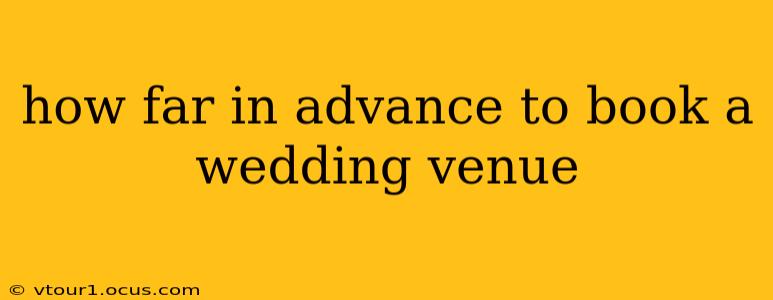How Far in Advance to Book a Wedding Venue: A Comprehensive Guide
Planning a wedding is a whirlwind of excitement, stress, and countless decisions. Securing your dream venue is arguably one of the most crucial steps, and knowing when to book is key to avoiding disappointment and securing your preferred date. The simple answer is: the sooner, the better. But let's delve deeper into the factors influencing this crucial decision.
What Factors Determine How Early You Should Book?
Several elements play a significant role in determining how far in advance you should book your wedding venue:
-
Popular Venue: High-demand venues, particularly those with stunning aesthetics or unique features, often book years in advance. Think iconic estates, picturesque vineyards, or trendy city spaces. If your heart is set on a specific, popular venue, you might need to book 18-24 months, or even longer, especially for peak wedding seasons (spring and fall).
-
Wedding Date: Weekend dates, especially during peak wedding seasons, are the most sought-after and book up quickly. If you're flexible with your wedding date, you'll have more options and potentially snag a great deal with a shorter booking timeframe. Weekday weddings or off-season dates usually offer more availability and potentially reduced costs.
-
Guest Count: Large weddings require larger venues, which are inherently in shorter supply. If you're planning a large celebration, begin your venue search much earlier than smaller weddings.
-
Venue Location: Popular wedding destinations, such as beach towns or mountain resorts, often have limited venue options and increased demand. This necessitates booking significantly earlier than less popular locations.
-
Budget: Higher-budget venues tend to be more exclusive and book up faster. Similarly, very affordable venues may also fill up rapidly due to high demand from couples on a budget.
How Far in Advance Do Most Couples Book?
While there's no magic number, most couples book their wedding venue 12-18 months in advance. This timeframe provides a comfortable balance between securing a desired date and avoiding excessive stress early in the planning process. However, as mentioned above, this is a general guideline, and individual circumstances heavily influence the ideal booking time.
What Happens If I Wait Too Long?
Waiting too long to book your venue carries significant risks:
-
Limited Availability: Your preferred date may be unavailable, forcing you to compromise on your ideal date or venue.
-
Increased Costs: Last-minute bookings often result in higher prices, as venues may increase their rates to fill remaining slots.
-
Reduced Options: You might be left with fewer venue choices, potentially settling for a less desirable option.
What If I'm Planning a Destination Wedding?
Destination weddings require even more advanced planning. Many destination venues book 24 months or more in advance, especially if your wedding coincides with a popular travel season.
When Should I Start Looking at Venues?
It’s wise to begin your venue search 24-36 months before your target wedding date. This allows ample time to research, visit potential venues, and secure your preferred option without feeling rushed. Even if you don't book immediately, visiting venues early gives you a better understanding of pricing, availability, and overall venue suitability.
Should I Book a Venue Before Setting a Date?
While not strictly necessary, booking a venue before setting a date can sometimes be beneficial, especially for in-demand venues. Many couples find the venue significantly influences the overall wedding style and date selection. This approach allows more flexibility in date selection while also securing your dream venue.
In conclusion, booking your wedding venue is a significant step demanding careful consideration. While the average couple books 12-18 months in advance, the ideal timeframe depends heavily on individual circumstances. Remember, the sooner you start your search, the better your chances of securing your dream venue and making your wedding day truly special.
